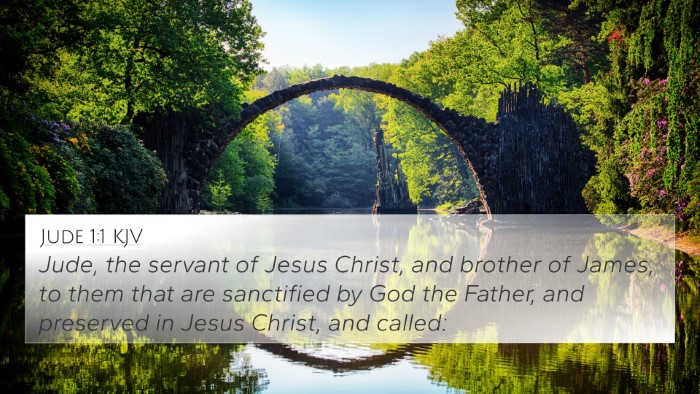Old Testament
Genesis Exodus Leviticus Numbers Deuteronomy Joshua Judges Ruth 1 Samuel 2 Samuel 1 Kings 2 Kings 1 Chronicles 2 Chronicles Ezra Nehemiah Esther Job Psalms Proverbs Ecclesiastes Song of Solomon Isaiah Jeremiah Lamentations Ezekiel Daniel Hosea Joel Amos Obadiah Jonah Micah Nahum Habakkuk Zephaniah Haggai Zechariah MalachiJob 29:2 Similar Verses
Job 29:2 Cross References
Oh that I were as in months past, as in the days when God preserved me;
Uncover the Rich Themes and Topics of This Bible Verse
Listed below are the Bible themes associated with Job 29:2. We invite you to explore each theme to gain deeper insights into the Scriptures.
Job 29:2 Cross Reference Verses
This section features a detailed cross-reference designed to enrich your understanding of the Scriptures. Below, you will find carefully selected verses that echo the themes and teachings related to Job 29:2 KJV. Click on any image to explore detailed analyses of related Bible verses and uncover deeper theological insights.

Job 1:10 (KJV) »
Hast not thou made an hedge about him, and about his house, and about all that he hath on every side? thou hast blessed the work of his hands, and his substance is increased in the land.

Job 1:1 (KJV) »
There was a man in the land of Uz, whose name was Job; and that man was perfect and upright, and one that feared God, and eschewed evil.

Psalms 37:28 (KJV) »
For the LORD loveth judgment, and forsaketh not his saints; they are preserved for ever: but the seed of the wicked shall be cut off.

Jeremiah 31:28 (KJV) »
And it shall come to pass, that like as I have watched over them, to pluck up, and to break down, and to throw down, and to destroy, and to afflict; so will I watch over them, to build, and to plant, saith the LORD.

Jude 1:1 (KJV) »
Jude, the servant of Jesus Christ, and brother of James, to them that are sanctified by God the Father, and preserved in Jesus Christ, and called:
Job 29:2 Verse Analysis and Similar Verses
Understanding Job 29:2
Job 29:2 states, "Oh, that I were as in months past, as in the days when God preserved me!" This verse reflects on Job's longing for the past—a time when he felt God’s protective presence in his life. The following is a summarized explanation of this verse, drawing insights from various public domain commentaries.
Historical Context
The Book of Job is considered one of the most significant works in the Bible, addressing profound themes of suffering, divine justice, and faith. Job was a wealthy and respected man who faced intense trials and suffering, losing his wealth, health, and family. This verse reflects the emotional and spiritual state of Job as he grapples with his misfortunes.
Commentary Insights
-
Matthew Henry:
Matthew Henry suggests that Job’s recollection of past blessings serves as a stark contrast to his current anguish. This verse reveals Job's nostalgia for the days of God's favor, highlighting his prior contentment and sense of security, which he now lacks.
-
Albert Barnes:
Barnes emphasizes Job's desire to return to a state of divine protection and blessing, asserting that the memories of the past provide comfort amid the suffering. Job’s longing illustrates the human tendency to seek refuge in earlier, more favorable times.
-
Adam Clarke:
Adam Clarke points to the importance of God's providence, noting that Job acknowledges God’s hand in his previous state of well-being. Clarke argues that this awareness is crucial in understanding both the nature of suffering and the persistent hope for restoration.
Thematic Connections
This verse not only highlights Job's personal grief but also opens up broader discussions about the theme of lamentation and the quest for divine favor, resonating with various other Biblical texts. Here are some relevant Bible verse cross-references:
- Psalm 42:5: "Why are you cast down, O my soul? And why are you in turmoil within me? Hope in God; for I shall again praise him, my salvation."
- Ecclesiastes 7:10: "Say not, 'Why were the former days better than these?' For it is not from wisdom that you ask this."
- Isaiah 38:15: "What shall I say? He has spoken to me, and he himself has done it. I walk slowly all my years because of the bitterness of my soul."
- Jeremiah 2:5: "Thus says the Lord: What wrong did your fathers find in me that they went far from me, and went after worthlessness and became worthless?"
- Luke 15:17: "But when he came to himself, he said, 'How many of my father’s hired servants have more than enough bread, but I perish here with hunger!'"
- 2 Corinthians 1:3-4: "Blessed be the God and Father of our Lord Jesus Christ, the Father of mercies and God of all comfort, who comforts us in all our affliction."
- Revelation 21:4: "He will wipe away every tear from their eyes, and death shall be no more, neither shall there be mourning, nor crying, nor pain anymore, for the former things have passed away."
Cross-Referencing Biblical Texts
The process of cross-referencing biblical texts, such as finding the connections between Job and other Scriptures, enriches our understanding of faith and suffering. Tools for Bible cross-referencing can help readers explore these links effectively. By examining similar themes, such as loss and restoration, one can gain deeper insights into God's nature and His relationship with humanity.
Methods of Cross-Referencing
To utilize cross-references effectively:
- Use a Bible Concordance: This tool helps locate verses on specific topics or themes.
- Employ a Bible Cross-Reference Guide: Many Bibles include cross-references in the margins that connect verses relevant to particular themes.
- Participate in Cross-Reference Bible Study: Group studies can facilitate discussions on verse connections and enhance understanding.
- Explore Inter-Biblical Dialogues: Make connections between Old and New Testament themes to grasp the continuity of God’s message.
Conclusion
Job 29:2 serves as a poignant reminder of the struggles faced in life and the importance of remembering times of divine favor and protection. Through comparative analysis and thematic connections, readers can find deeper understanding and comfort in God's promises, as well as ways to cross-reference scriptures to enrich their studies.



